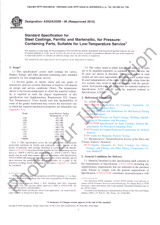Wir benötigen Ihre Einwilligung zur Verwendung der einzelnen Daten, damit Sie unter anderem Informationen zu Ihren Interessen einsehen können. Klicken Sie auf "OK", um Ihre Zustimmung zu erteilen.
ASTM C779/C779M-19
Standard Test Method for Abrasion Resistance of Horizontal Concrete Surfaces
Name übersetzen
NORM herausgegeben am 1.10.2019
Informationen über die Norm:
Bezeichnung normen: ASTM C779/C779M-19
Ausgabedatum normen: 1.10.2019
SKU: NS-976091
Zahl der Seiten: 6
Gewicht ca.: 18 g (0.04 Pfund)
Land: Amerikanische technische Norm
Kategorie: Technische Normen ASTM
Kategorie - ähnliche Normen:
Die Annotation des Normtextes ASTM C779/C779M-19 :
Keywords:
abrasion, concrete, impact, surface treatments, wear,, ICS Number Code 91.100.30 (Concrete and concrete products)
Ergänzende Informationen
| Significance and Use | ||||||||
|
4.1 The three test methods provide simulated abrasion conditions, which can be used to evaluate the effects on abrasion resistance of concrete, concrete materials, and curing or finishing procedures. They may also be used for quality acceptance of products and surface exposed to wear. They are not intended to provide a quantitative measurement of length of service. 4.2 The equipment used by each of these procedures is portable and thus suitable for either laboratory or field testing. The three procedures determine the relative wear of concrete surfaces as follows: 4.2.1 Procedure A—The revolving-disk machine operates by sliding and scuffing of steel disks in conjunction with abrasive grit. 4.2.2 Procedure B—The dressing-wheel machine operates by impact and sliding friction of steel dressing wheels. 4.2.3 Procedure C—The ball-bearing machine operates by high-contact stresses, impact, and sliding friction from steel balls. Note 2: Diagrams of three machines meeting these
specifications are shown in Fig.
1, Fig. 2, and
Fig. 3.4
FIG. 1 Revolving Disks Abrasion Test Machine FIG. 2 Dressing Wheel Abrasion Test Machine FIG. 3 Ball Bearing Abrasion Test Machine |
||||||||
| 1. Scope | ||||||||
|
1.1 This test method covers three procedures for determining the relative abrasion resistance of horizontal concrete surfaces. The procedures differ in the type and degree of abrasive force they impart, and are intended for use in determining variations in surface properties of concrete affected by mixture proportions, finishing, and surface treatment. They are not intended to provide a quantitative measurement of the length of service that may be expected from a specific surface. 1.2 The values stated in either SI units or inch-pound units are to be regarded separately as standard. Within the text, the inch-pound units are shown in brackets. The values stated in each system may not be exact equivalents; therefore, each system shall be used independently of each other. 1.3 The text of this standard references notes and footnotes that provide explanatory material. These notes and footnotes (excluding those in tables and figures) shall not be considered as requirements of this standard. 1.4 This standard does not purport to address all of the safety concerns, if any, associated with its use. It is the responsibility of the user of this standard to establish appropriate safety, health, and environmental practices and determine the applicability of regulatory limitations prior to use. Note 1: Other procedures are available for measuring the abrasion resistance of concrete surfaces in addition to the three procedures contained in this test method. Consideration should be given to Test Methods C944/C944M and C418. The test method most closely representing service conditions should be used. 1.5 This international standard was developed in accordance with internationally recognized principles on standardization established in the Decision on Principles for the Development of International Standards, Guides and Recommendations issued by the World Trade Organization Technical Barriers to Trade (TBT) Committee. |
||||||||
| 2. Referenced Documents | ||||||||
|
Empfehlungen:
Aktualisierung der technischen Normen
Wollen Sie sich sicher sein, dass Sie nur die gültigen technischen Normen verwenden?
Wir bieten Ihnen eine Lösung, die Ihnen eine Monatsübersicht über die Aktualität der von Ihnen angewandten Normen sicher stellt.
Brauchen Sie mehr Informationen? Sehen Sie sich diese Seite an.




 Cookies
Cookies
